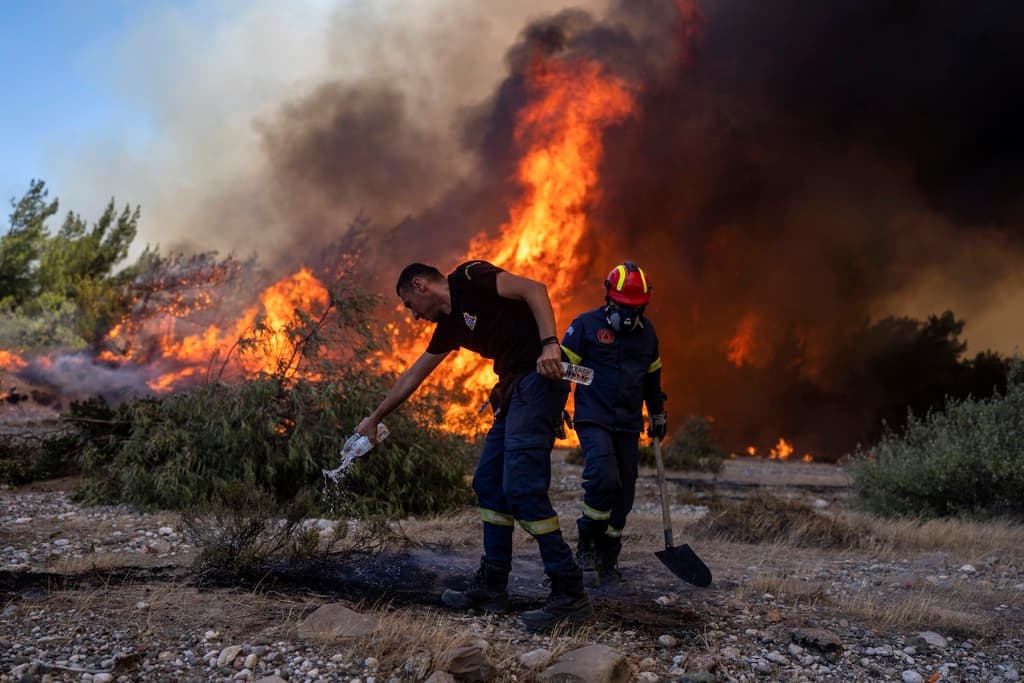Fires Fry Southern Europe, Reigniting Debate About Role of Climate Change in Natural Disasters
What’s really behind the blazes around the Mediterranean is up for debate.

ATHENS — Prime Minister Mitsotakis was hardly exaggerating when he told the Greek parliament on Monday that “for the next few weeks, we must be on constant alert. We are at war.” As firefighters battle devastating wildfires that have scorched areas near Athens and the islands of Rhodes and Corfu, forcing an unprecedented mass evacuation of tourists by land and by sea, the outlook for the rest of a summer already marred by searing heat is uncertain at best.
As smoke cleared around Athens, where the first round of fires broke out earlier this month, other locations around the southern Mediterranean were going up in flames. Fires raging in mountain villages and forests in northern Algeria have left at least 34 people dead. Among those who perished were 10 soldiers encircled by flames during an evacuation, Algeria’s defense ministry reported.
In Italy, authorities had to temporarily shut Palermo’s Falcone-Borsellino Airport as wildfires encircled the Sicilian capital. More than 55 wildfires have been burning in the Mediterranean’s largest island.
For now, much of the world’s attention is focused on Greece — in part because of the dramatic footage that emerged over the weekend of thousands of mainly British tourists being evacuated from smoke-filled beaches while flames threatened to engulf many upscale hotels on the south coast of Rhodes. Adding to Greece’s woes, on Tuesday one of the Greek air force’s water-dropping planes crashed while diving into a wildfire burning on the large island of Evia. Both pilots were reported dead.
All of this bedlam is breaking out at the peak of the summer tourist season, but a short-term public relations disaster may be the least of worries for Greece, where tourism accounts for a quarter of GDP. Mr. Mitsotakis is correct in evoking a war: Even as the Rhodes fire is burning, forecasts call for another triple-digit heatwave to persist at least through mid-week. Much of the center of Athens is a ghost town, as residents and tourists shun the heat and fierce afternoon sun.
Something else Mr. Mitsotakis said just ahead of the Greek parliament’s summer recess may raise hackles in some quarters. “The climate crisis is already here,” he said, adding “it will manifest itself everywhere in the Mediterranean with greater disasters.”
How many of the fires now burning are due to climate change and how much is due to a combination of seasonably hot weather and human negligence? Putting aside the question of arson in some of the fires, which has yet to be ruled out, the fact is that Mediterranean summers, like some summers elsewhere, tend to be dry, windy, and hot. That is partly the reason why opposition leaders accused the premier’s New Democracy party of having an ineffective fire prevention plan and of insufficient forest protection.
The leader of the left-wing Syriza parliamentary group, Sokratis Famellos, said, “For seven days we have devastating fire in Rhodes, impact in Attica, fronts in Achaia, Karystos, Corfu … even if belatedly, the disasters are linked to the climate crisis,” adding, “We point out the danger that the climate crisis is also a convenient excuse.”
Mr. Famellos said that fire prevention was critical and suggested that parts of the fire brigade have been understaffed.
Another parliamentary heavyweight, Nikos Androulakis, the socialist party chief, hammered on a similar theme of alleged unpreparedness: “What happened to the special surveillance and warning systems with drones, the 13 regional operational centers of civil protection?” he asked Mr. Mitsotakis.
The head of Greece’s influential communist party, Dimitris Koutsoumpas, pulled no punches in the parliamentary session. “A picture is worth a thousand words. Next to the five-star hotels, tourists piled into a farmer’s cart to escape the flames,” he said.
“You will tell us again about climate change and the crisis that has come from climate change,” Mr. Koutsoumpas said, also addressing Mr. Mitsotakis, adding that this is “the familiar candy that you, unfortunately, constantly dole out, and all governments, to cover your criminal responsibilities.”
He echoed the refrain that climate change is not necessarily the culprit: “Is climate change to blame for the absence of a comprehensive prevention-focused fire protection plan?” Mr. Koutsoumpas asked. “ What are the preventive measures you took?”
Because Greece is a member of the European Union, debate that happens on the floor of the Greek parliament will not necessarily stay there. The powers that be at Brussels who concocted the European Green New Deal are getting pushback from unlikely sources in countries such as France and Germany.
A leading German CEO, Toralf Haag, recently told Die Welt that Germany is on the brink of deindustrialization because of its obsession with climate targets and overregulation. Investment decisions in Germany are becoming increasingly difficult, Mr. Haag said, as bureaucracy and regulation are increasing and “we now see almost every day that industrial companies are no longer investing in Germany but in other regions of the world.”
While debate about the green economy in northern Europe and a catalog of conflagrations in southern Europe may not at first appear to be interrelated, they are. When political pushback against climate change as the go-to scapegoat for natural disaster meets with opposition to climate imperialism from Europe’s biggest economy, more than glaciers are at risk of melting: flawed arguments will tend to thaw out, too.

